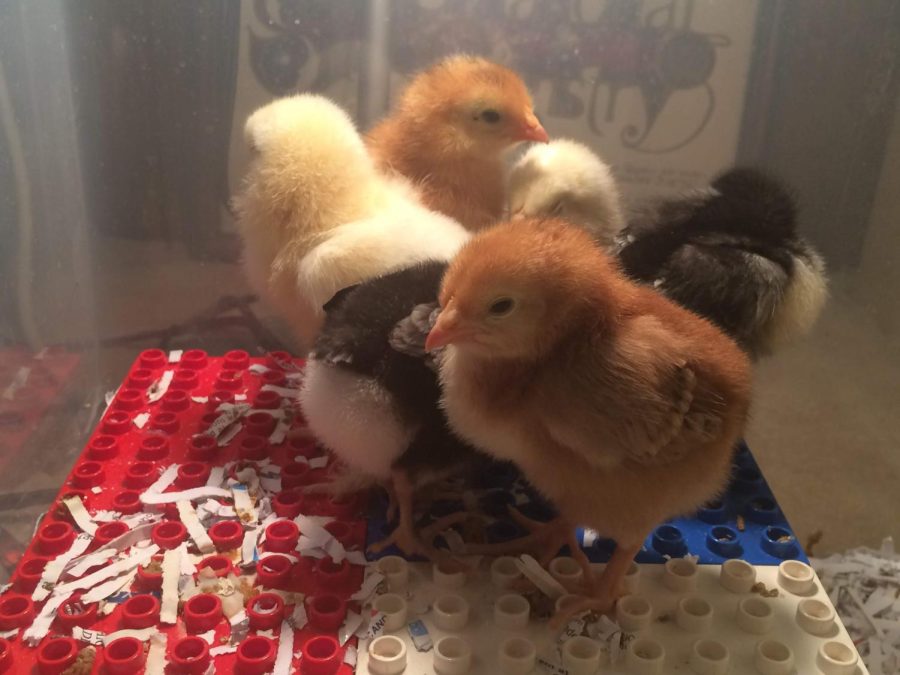Thank You, Chickens
November 18, 2022
When I was in elementary school, my family bought six chickens for $10.
Two were white, two were black, and two were brown—a deliberate symmetry my nine-year-old self found satisfying. At the time, they were small enough to nestle in my hand. Their chirps sounded like kitten mewls. Two months later, the chicks had grown into hens. We received noise complaints from neighbors about all the crowing. Eventually they moved to a backyard coop bought off Amazon, which stood in the shade of a giant oak tree. I’d feed them in the morning and let them out for the day. They loved the wooded hills of my backyard, and took dust baths in the ivy that grew there. Though taking care of six chickens could be grueling work (especially when it came to cleaning the coop), their presence was quickly incorporated into my family’s daily routines, as we grew used to looking after them. And while my chickens never received proper names—for practical purposes, they were White Chicken #1, White Chicken #2, Brown Chicken #1, and so on—they quickly became beloved members of my family. I’ll always be thankful for their presence in my life.
People don’t typically think of chickens as pets, much less as affectionate ones. Before getting to know them, I didn’t expect mine to be anything other than loud, feathered, and dusty. They were all those things—but my hens were also sweet in small ways. Today, that’s what I remember best about them. It was always a calming evening ritual for our family to spend time sitting with the chickens on the patio. In fact, if I was quiet enough, they’d eat grain right out of my hand. My chickens would cluck with joy whenever I approached; Brown Chicken #2, who was particularly friendly, would all but sprint towards me. Every week, my chickens would lay dozens of free eggs, and they’d let me know how proud they were by nudging the eggs each time we opened the roosting box. My chickens were plucky, and had personality: as a cohort of six, they wandered around the neighborhood unrestrained, and I vividly remember the night a bear attacked our backyard, turning the coop into a mess of splinters and mud. The next day, I found all the hens roosting up an oak tree. Their feathers were ruffled, and they clucked with indignation, as if to say, it’s about time you got here!
That day, I was happy beyond belief to find my chickens safe. In an ideal world, they would’ve lived forever. Unfortunately, Arcadia is frequented by coyotes and raccoons (and, obviously, bears). Combine that with several free-roaming chickens, and something is bound to go wrong. Where there were two white chickens, soon enough, there were none. The two black hens had always nested together; suddenly, one was alone. It was only nature at work…but that didn’t make the death of my pets any less depressing.
The thing with animals, fortunately, is that they’re hardier than people. Even as the number of hens grew smaller, my surviving chickens continued to approach life with an undaunted attitude. And I realized something about those chickens: they weren’t intimidated by death in the slightest. Fear of predators never stopped them from wandering the backyard. They still went out and explored from dusk until dawn. Rather than hiding away in their coop, my chickens were intent on living life to the fullest. Call it endearing or call it plain foolish, but I genuinely admired that about them. It’s important to understand that most domestic poultry are raised for slaughter, and die when they’re only two months old. When the last of them passed in 2021, I realized that my chickens lived as long and happily as any hens could. Thanks to them, I not only gained a wealth of memories to look back on; I was also able to examine loss from a more mature perspective.
Whenever I tell someone I once owned pet chickens, their first question is always whether or not I ate them. I find that question confusing: you wouldn’t hear the same about a cat or a dog. Owning chickens brightened my life significantly. They were the most unusual, most unpredictable creatures I’ve ever known, and I miss them very much. Wherever my chickens are now, I hope they’re all happy. The best place for them was always a backyard with lots of oak trees; yellow sunshine and a cloudless sky.


Shelley Kong Lai Ping • Apr 22, 2023 at 10:19 AM
I keep several hens too, for their company, as much as for their eggs. The first generation was killed when the bottom of their nestling box was dismantled by a fox??? I was told that the Mr fox go hunting in the spring to feed Mrs Fox and their kids. In my grief, the thought that at least my hens nourished a fox family was a solace and I am resigned to the jungle law–life means eating and being eaten.
I am a woman and a mother, thus creating a certain affinity between my hens and I.
By the way, I am your grandmother’s sister from France